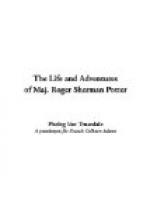Notwithstanding Commander Potter kept at a safe distance from the bullets, his horse, Battle, took it into his head to play him a very shabby trick, and which my love for the truth of history constrains me to record. Wonderful then as it may seem to those experienced in war, this little prank of the faithful steed ended the term of his own life and, as if by a miracle, gave the victory to the allies. And it was done in this manner. A bountiful providence, as if foreseeing the sanguinary character of the struggle that was to take place on this spot, had provided it with a quag-mire of considerable depth, and so covered its surface with soft, green moss, as to conceal its real character. It was on the margin of this mire then that General Potter took up his position; and just in the very hottest of the battle, a bee chanced that way in search of flowers, and lighting just under old Battle’s tail, so goaded him with its sting that he sprang forward, and then halted with such a sudden motion as to vault the general over his head, and into the mire, his head and three-cornered hat only remaining above the surface. Having served his master this shabby trick, old Battle took to his heels, and dashing down the enemy’s lines, sent such a thrill of terror to the hearts of the superstitious Kaloramas as made them scamper for dear life. In truth they fancied him the pale horse of the devil, so often described to them by the priests. Dashing onward with increased speed and wildness, the bewildered animal ran with great force upon the King’s mule, prostrating animal and rider dead upon the ground, and, in sorrow and tears do I record it, breaking his own neck. Thus was the interposition of providence displayed in all its bounties, and an end put to a battle which, had it continued, there is no estimating the consequences. As it was, the King, old Battle, and the mule alone paid the penalty of their temerity, and lay dead upon the field. Thus ended the great battle of the Miracle.




